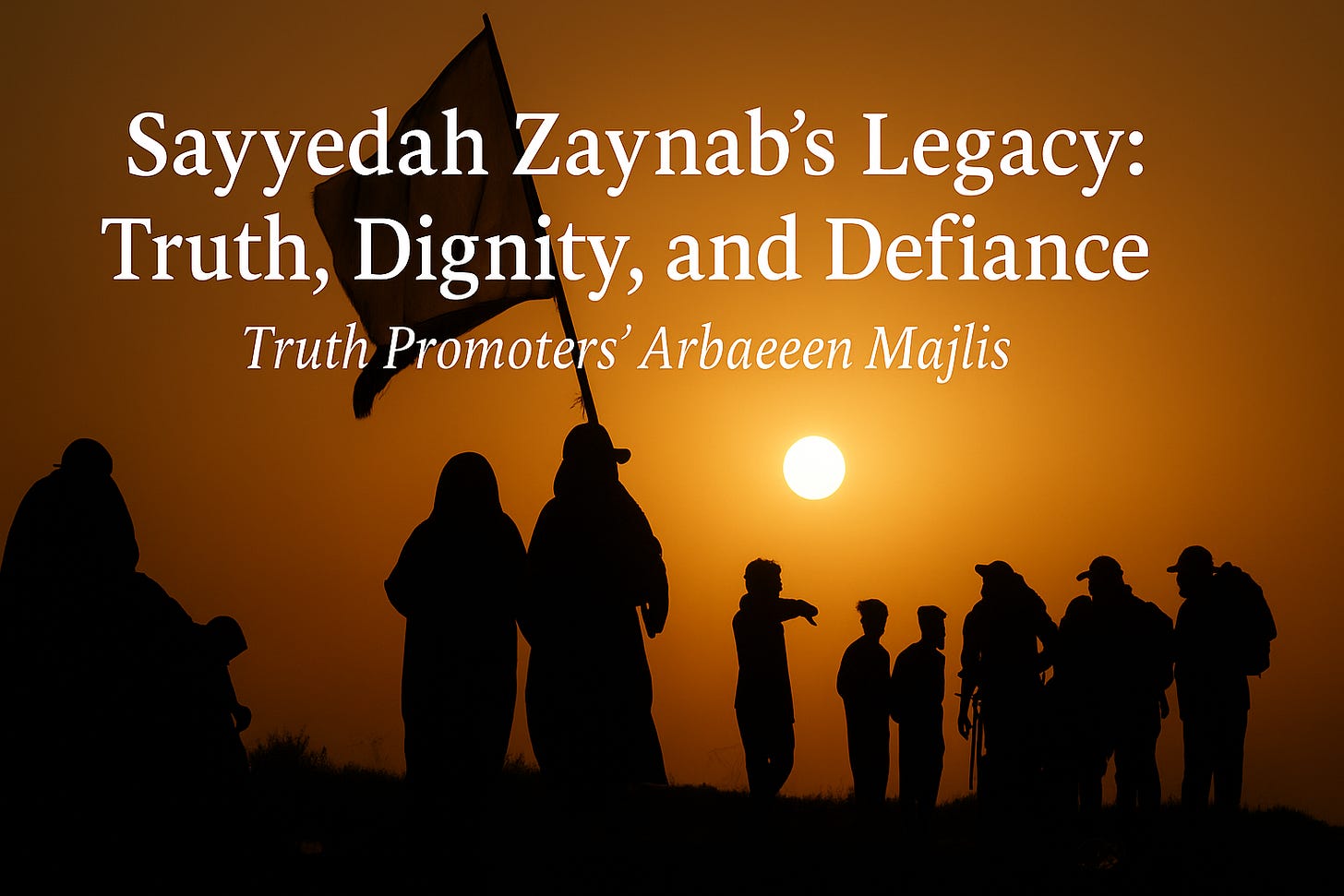Sayyedah Zaynab’s Legacy: Truth, Dignity, and Defiance — Truth Promoters’ Arbaeen Majlis
Throughout Islamic history, women have stood as agents of revelation and transformation. Far from passive figures, they were pioneers of divine resistance.
GLOBAL, PUREWILAYAH.COM — The fourth night of the ongoing Arbaeen 2025/1447 lecture series, hosted by Truth Promoters and streamed live on YouTube, carried forth a powerful message of courage, clarity, and resistance. Following the established format—Qur’an recitation, poetic couplets, central lecture, maqtal, nohe, and Ziyarat Arbaeen—the evening offered a profound reflection on the enduring legacy of Sayyedah Zaynab bint Ali.
In the Footsteps of Sayyedah Zaynab
The central address, delivered by Sheikh Shabbir Hassanally, was titled “Tabyeen – In the Footsteps of Sayyedah Zaynab.” Building on the previous night’s emphasis on youth as the torchbearers of truth, this session turned the spotlight to the often-overlooked role of women in carrying the message of Karbala forward.
Sheikh Hassanally framed Sayyedah Zaynab’s post-Ashura mission as the very embodiment of Tabyeen—the duty to clarify truth in the face of distortion and tyranny.
Her eloquent speeches in the courts of Kufa and Damascus were highlighted not merely as historical acts of defiance, but as timeless declarations that shattered the oppressor’s narrative. Through these moments, Sayyedah Zaynab ensured that the moral clarity of Karbala would echo across generations.
Drawing on Qur’anic examples such as the mother of Prophet Musa, Sayyedah Asiyah, Sayyedah Maryam, and Sayyedah Hajar, Sheikh Hassanally reminded the audience that throughout Islamic history, women have stood as agents of revelation and transformation. Far from passive figures, they were pioneers of divine resistance.
The lecture also addressed the weaponization of shame—both historically and in modern times—as a means to silence women. Sayyedah Zaynab’s unwavering dignity, even while chained and mocked, was presented as a model for confronting spiritual and emotional abuse with grace and strength.
Her legacy, the speaker emphasized, should not be confined to mourning rituals alone, but must inspire leadership development, family reform, and community healing.
Turning to contemporary examples, Sheikh Hassanally invoked the lives of women like Amina Bint al-Huda, Marzieh Hadidchi, Razan al-Najjar, Shireen Abu Akleh, and Serena Shim as modern inheritors of Zaynabi courage. These women, across different regions and contexts, embodied the same spirit of fearless Tabyeen—speaking truth to power, regardless of the cost.
The lecture concluded with a call to reclaim the Islamic narrative on gender and leadership. True honor, Sheikh Hassanally insisted, lies not in social status but in fidelity to truth. And true shame is not in being oppressed, but in remaining silent when injustice prevails.
🔗 Full lecture text: Tabyeen 14 - Reflections313
Maqtal: Dignity in the Court of Tyranny
The emotional centerpiece of the night unfolded with the maqtal, recounting the heart-wrenching moment when the Prophet’s family was brought to Yazid’s court in Damascus. Stripped of their protection and dignity, the captives—led by Sayyedah Zaynab and Imam Zayn al-Abidin—stood firm in defiance.
Their words pierced through the spectacle of tyranny, reminding even non-Muslim dignitaries of the sacred lineage and moral authority of the Ahlulbayt. The episode remains a powerful testament to how truth, even when bloodied and bound, can disarm empires.
🔗 Full maqtal: Arbaeen Maqtal 4 - The Entry of the Family of the Prophet into Yazid’s Court
Latmiya
In one of the most impassioned moments of the Truth Promoters Arbaeen Majlis programme, the nohe “Ya Zainab” resounded as both lamentation and rallying cry. Centred on the figure of Sayyidah Zainab (peace be upon her), the piece portrayed her as the voice of the oppressed, champion of the blessed, guardian of the weak, and mother of the meek. Through vivid scenes — from the scorching sands of Karbala to the hostile streets of Sham, from the shackles of captivity to the court of the tyrant Yazid — the verses painted Zainab’s unyielding courage in the face of humiliation, loss, and injustice.
The lamentation gave voice to her defiance as she confronted the killers of her brother, Imam Hussain, and defended the ailing Imam Zainul Abedeen. It recalled her fearless speech in the palace of Yazid, her condemnation of hypocrisy, and her unwavering trust in Allah’s justice. Interwoven refrains reinforced her enduring legacy, while the closing verses tied her mission directly to the awaited Imam al-Mahdi — the avenger of Hussain — urging believers to transform their tears into swords and stand as mujahideen of tabyeen in defence of truth. More than a tribute, “Ya Zainab” was a reminder that in every era, her voice calls upon the faithful to confront oppression with clarity, dignity, and resistance.
🔗 Listen: Ya Zainab - ShiaSounds
Ziyarat Arbaeen: “The Witness to Prayer”
The program closed with a meditative reading from The Communion of Arbaeen. The poetic, interpretative, inspirational translation of Ziyarat Arbaeen titled “The Witness to Prayer,” captured the spiritual essence of Imam Hussain’s martyrdom.
Beyond the battlefield, his legacy was described as one that carved sanctuaries within hearts—teaching souls to remain in prayer even in the shadow of death. His sacrifice, born of hunger, pain, and divine longing, was not the end, but a call: to rise, to carry the banner of justice, and to live in allegiance with the path he forged.
🔗 Listen: The Communion of Arbaeen - ShiaSounds
Global Access Through Hyder AI
As part of an ongoing collaboration with Hyder AI, Truth Promoters has made all lectures by Sheikh Shabbir Hassanally—alongside those of other scholars—available in multiple languages. Audiences from around the world can access these spiritually enriching sessions on the Hyder AI platform at: https://www.hyder.ai/en/lecture/56
For continued coverage of the Arbaeen 2025/1447 commemorations, follow Truth Promoters on YouTube and Hyder AI.
Watch the Full Majlis Recording
Program References
(PW)


